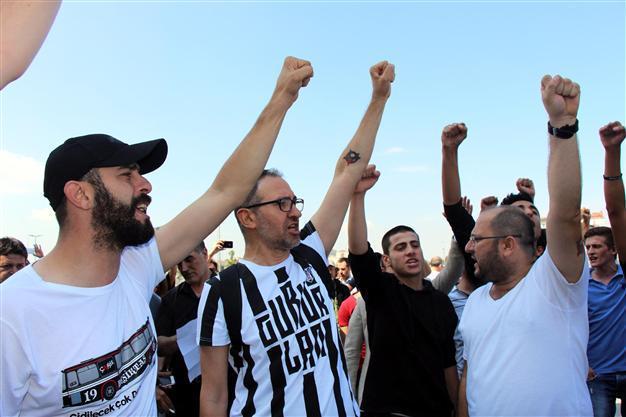Court delays coup plot case against football fan group çArşı
ISTANBUL – Doğan News Agency

DHA photo
An Istanbul court has postponed the trial of 35 members of a Beşiktaş football fan group, çArşı, who are accused of organizing a plot to topple the government during the 2013 Gezi Park protests.The hearing at Istanbul’s Çağlayan courthouse was postponed after the prosecutor demanded more time to present his opinion, which was expected to take place during this hearing, after requested information about a piece of prosecution evidence failed to materialize.
Prosecutor Abdullah Mirza Coşkun said that the criminal expert report on a Blow Magnum branded semi-automatic gun, which belonged to the suspect Arda Mutlu Doğan, had stated that the gun was included in a law banning firearms that shoot metal marbles and balls. Coşkun said he was waiting for an answer from the gun’s producer on the manufacturing date of the gun in evidence, as it would help decide whether or not the gun was manufactured before or after the law was enacted.
Coşkun added that he could only give his opinion afterwards, a demand which was accepted by Istanbul’s 13th Court of Serious Crimes. The case was postponed to Sept. 11.
While 23 of the suspects were present at court for the hearing, some Republican People’s Party (CHP) deputies, including Aykut Erdoğdu, Ali Haydar Hakverdi, Eren Erdem, İlhan Cihaner, former CHP deputy Umut Oran and Beşiktaş Mayor Murat Hazinedar also observed the proceedings.
After the court delayed the hearing, a group of Beşiktaş fans chanted slogans both inside and outside the courthouse in support of the suspects.
A lawsuit was opened against the 35 members of çArşı, when the court accepted Sept. 11, 2014, an indictment charging the suspects with “attempting a coup” against the government. According to the indictment, the çArşı members are accused of attempting to capture the prime ministry’s offices in Ankara and Istanbul with the aim of creating an “Arab Spring-like upheaval” and attempting to overthrow the government during the Gezi Park protests.
The 2013 protests began as an environmental sit-in in Istanbul and quickly spread across the country as anti-government protests over plans to replace the Gezi Park in central Istanbul with a shopping mall designed like Ottoman-era military barracks.
















